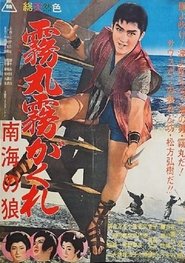detail profile kisho nomura
Peran Yang Di Mainkan Kisho Nomura
 Test driver Hayami loses control of...
Test driver Hayami loses control of...A Savage Beast Goes Mad 1976
Test driver Hayami loses control of his car and rolls over. His company then learns that he has kept secret that he is visually impaired, and he is fired. Without the prospect of returning to his old job he makes a plan to rob several jewelry stores. A few days later, Hayami escapes with stolen goods worth 80 million yen in a violin case on a Kyoto city bus. A wild chase ensues.
 Junko Fuji returns as Oryu the...
Junko Fuji returns as Oryu the...Red Peony Gambler: Biographies of a Gambling Room 1969
Junko Fuji returns as Oryu the Red Peony, a wandering female yakuza on a soul-searching journey after the death of her father. After collecting her sickly follower from jail, she is taken in by a fishing village. Feeling indebed to their generosity, she stays to work for the village and promises to leave her yakuza ways behind. When a dispute breaks out for the gambling rights to a local festival, the villagers are harrassed by a gang of thugs. When the harrassment turns violent, Oryu must decide wither to keep her promise or protect the villagers.
 Kogure an industrial spy is tasked...
Kogure an industrial spy is tasked...Industrial Spy 1968
Kogure, an industrial spy, is tasked by Sawada, head of the research department of the Nisshin Corporation, to learn the secrets of the design of a new engine invented by a rival company. Kogure manages to obtain the secrets, but Sawada's goal was not the secrets themselves, but to use them to obtain the position of president of the company. Angered by Sawada's dirty tricks, Kigure begins to take revenge.
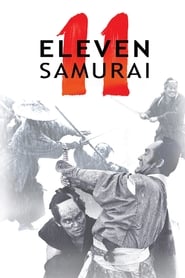 The lord of the Oshi fief...
The lord of the Oshi fief...Eleven Samurai 1967
The lord of the Oshi fief is killed by his trespassing neighbour, the cruel and despotic Nariatsu, son of the former Shogun. After an investigation, the Oshi clan is blamed for what happened and sentenced to be disbanded. Eleven of the best samurai of the clan refuse the sentence and are willing to give their life for justice.
 The remake of Yoshikawas novel continues...
The remake of Yoshikawas novel continues...Miyamoto Musashi: Showdown at Hannyazaka Heights 1962
The remake of Yoshikawa's novel continues with the second installment in which Takezo, soon to be Miyamoto Musashi, emerges from the Himeji Castle after three years of intense contemplation and philosophical study and starting on his epic quest to complete his skill in the Way.
 A court fortuneteller loses his mind...
A court fortuneteller loses his mind...The Mad Fox 1962
A court fortune-teller loses his mind after a conspiracy leads to the death of his lover. Hope appears to be on the horizon after he becomes romantically involved with his dead lover's twin sister, but more complications arise thanks to a chance encounter with a clan of shape-shifters.
 As Japans Tokugawa shogunate nears the...
As Japans Tokugawa shogunate nears the...Sakura Official 1962
As Japan’s Tokugawa shogunate nears the end of its rule, Edo North Magistrate Toyama no Kinsan is called upon to judge the most difficult case of his career. In a masterfully woven tale, he has to face the truth about his estranged father’s possible involvement in a nefarious plot to take over rule of the Hizen Shimabara clan by assassinating the rightful lord, his son, and install one of Shogun Ienari’s offspring as daimyo.
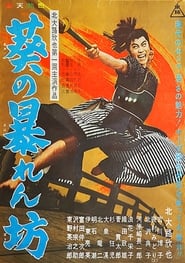 A young son of a master...
A young son of a master...Fine Man 1961
A young son of a master of the Kuwana clan gets disowned for his rebellious behavior. After he goes from the mountains to the ocean defeating the evil, he becomes a fine man.
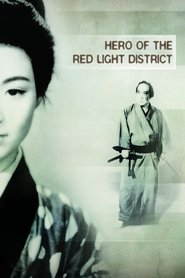 A successful textile industrialist from the...
A successful textile industrialist from the...Hero of the Red Light District 1960
A successful textile industrialist from the provinces, who is beloved by his employees for his kindness, cannot find a wife because of a disfiguring birthmark on his face. Even the courtesans in Yoshiwara refuse to entertain him, until an indentured peasant prostitute, Tamarazu, takes the unsavoury assignment and treats him with brash tenderness.
 The adopted son of an Osaka...
The adopted son of an Osaka...Chikamatsu's Love in Osaka 1959
The adopted son of an Osaka courier falls in love with a prostitute and, discovering that she is about to be purchased by a client, steals money from his employer to redeem her. Hunted criminals, the two young lovers take flight to Yamato, but, as in Chikamatsu's other domestic tragedies of love and duty (known as sewamono), they must be pursued and their passion destroyed by death. Favourite Uchida themes, such as the indenturing of a prostitute , and his characteristic emphasis on performance and theatrical artifice re-emerge here; but the daring device of having Chikamatsu appear as a character - not unlike having Shakespeare interpolated into a film adaptation of one of his plays - is just one of many surprises this remarkable film holds. “Extraordinary” (Donald Richie).
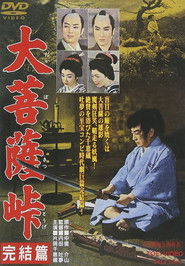 Master swordsman Tsukue Ryunosuke is confronted...
Master swordsman Tsukue Ryunosuke is confronted...Souls in the Moonlight III 1959
Master swordsman, Tsukue Ryunosuke is confronted by the families of his victims. Will justice be served for the lost innocent lives? The conclusion of the famed Jidaigeki series is an amazing film, with a completely different perspective on the story from the later versions. While the international audience is more familiar with the “Sword of Doom” and “Satan’s Sword” versions of Daibosatsu Toge (The Great Bodhisattva Pass), the “Souls in the Moonlight” trilogy casts an entirely different light on Ryunosuke and his motives. Can this brutal killer be brought to justice, or is living his life as a blind wanderer a more terrible fate? His sword skills have not diminished, nor has his desire to kill!

 This anthology film consists of nine...
This anthology film consists of nine...